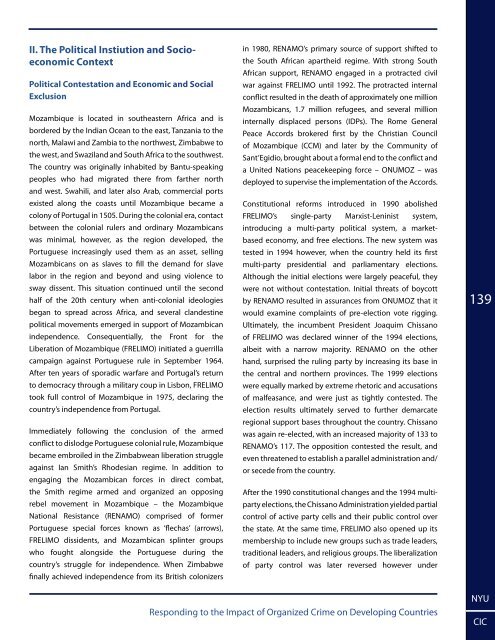here - Center on International Cooperation - New York University
here - Center on International Cooperation - New York University
here - Center on International Cooperation - New York University
Create successful ePaper yourself
Turn your PDF publications into a flip-book with our unique Google optimized e-Paper software.
II. The Political Instiuti<strong>on</strong> and Socioec<strong>on</strong>omic<br />
C<strong>on</strong>text<br />
Political C<strong>on</strong>testati<strong>on</strong> and Ec<strong>on</strong>omic and Social<br />
Exclusi<strong>on</strong><br />
Mozambique is located in southeastern Africa and is<br />
bordered by the Indian Ocean to the east, Tanzania to the<br />
north, Malawi and Zambia to the northwest, Zimbabwe to<br />
the west, and Swaziland and South Africa to the southwest.<br />
The country was originally inhabited by Bantu-speaking<br />
peoples who had migrated t<str<strong>on</strong>g>here</str<strong>on</strong>g> from farther north<br />
and west. Swahili, and later also Arab, commercial ports<br />
existed al<strong>on</strong>g the coasts until Mozambique became a<br />
col<strong>on</strong>y of Portugal in 1505. During the col<strong>on</strong>ial era, c<strong>on</strong>tact<br />
between the col<strong>on</strong>ial rulers and ordinary Mozambicans<br />
was minimal, however, as the regi<strong>on</strong> developed, the<br />
Portuguese increasingly used them as an asset, selling<br />
Mozambicans <strong>on</strong> as slaves to fill the demand for slave<br />
labor in the regi<strong>on</strong> and bey<strong>on</strong>d and using violence to<br />
sway dissent. This situati<strong>on</strong> c<strong>on</strong>tinued until the sec<strong>on</strong>d<br />
half of the 20th century when anti-col<strong>on</strong>ial ideologies<br />
began to spread across Africa, and several clandestine<br />
political movements emerged in support of Mozambican<br />
independence. C<strong>on</strong>sequentially, the Fr<strong>on</strong>t for the<br />
Liberati<strong>on</strong> of Mozambique (FRELIMO) initiated a guerrilla<br />
campaign against Portuguese rule in September 1964.<br />
After ten years of sporadic warfare and Portugal’s return<br />
to democracy through a military coup in Lisb<strong>on</strong>, FRELIMO<br />
took full c<strong>on</strong>trol of Mozambique in 1975, declaring the<br />
country’s independence from Portugal.<br />
Immediately following the c<strong>on</strong>clusi<strong>on</strong> of the armed<br />
c<strong>on</strong>flict to dislodge Portuguese col<strong>on</strong>ial rule, Mozambique<br />
became embroiled in the Zimbabwean liberati<strong>on</strong> struggle<br />
against Ian Smith’s Rhodesian regime. In additi<strong>on</strong> to<br />
engaging the Mozambican forces in direct combat,<br />
the Smith regime armed and organized an opposing<br />
rebel movement in Mozambique – the Mozambique<br />
Nati<strong>on</strong>al Resistance (RENAMO) comprised of former<br />
Portuguese special forces known as ‘flechas’ (arrows),<br />
FRELIMO dissidents, and Mozambican splinter groups<br />
who fought al<strong>on</strong>gside the Portuguese during the<br />
country’s struggle for independence. When Zimbabwe<br />
finally achieved independence from its British col<strong>on</strong>izers<br />
in 1980, RENAMO’s primary source of support shifted to<br />
the South African apartheid regime. With str<strong>on</strong>g South<br />
African support, RENAMO engaged in a protracted civil<br />
war against FRELIMO until 1992. The protracted internal<br />
c<strong>on</strong>flict resulted in the death of approximately <strong>on</strong>e milli<strong>on</strong><br />
Mozambicans, 1.7 milli<strong>on</strong> refugees, and several milli<strong>on</strong><br />
internally displaced pers<strong>on</strong>s (IDPs). The Rome General<br />
Peace Accords brokered first by the Christian Council<br />
of Mozambique (CCM) and later by the Community of<br />
Sant’Egidio, brought about a formal end to the c<strong>on</strong>flict and<br />
a United Nati<strong>on</strong>s peacekeeping force – ONUMOZ – was<br />
deployed to supervise the implementati<strong>on</strong> of the Accords.<br />
C<strong>on</strong>stituti<strong>on</strong>al reforms introduced in 1990 abolished<br />
FRELIMO’s single-party Marxist-Leninist system,<br />
introducing a multi-party political system, a marketbased<br />
ec<strong>on</strong>omy, and free electi<strong>on</strong>s. The new system was<br />
tested in 1994 however, when the country held its first<br />
multi-party presidential and parliamentary electi<strong>on</strong>s.<br />
Although the initial electi<strong>on</strong>s were largely peaceful, they<br />
were not without c<strong>on</strong>testati<strong>on</strong>. Initial threats of boycott<br />
by RENAMO resulted in assurances from ONUMOZ that it<br />
would examine complaints of pre-electi<strong>on</strong> vote rigging.<br />
Ultimately, the incumbent President Joaquim Chissano<br />
of FRELIMO was declared winner of the 1994 electi<strong>on</strong>s,<br />
albeit with a narrow majority. RENAMO <strong>on</strong> the other<br />
hand, surprised the ruling party by increasing its base in<br />
the central and northern provinces. The 1999 electi<strong>on</strong>s<br />
were equally marked by extreme rhetoric and accusati<strong>on</strong>s<br />
of malfeasance, and were just as tightly c<strong>on</strong>tested. The<br />
electi<strong>on</strong> results ultimately served to further demarcate<br />
regi<strong>on</strong>al support bases throughout the country. Chissano<br />
was again re-elected, with an increased majority of 133 to<br />
RENAMO’s 117. The oppositi<strong>on</strong> c<strong>on</strong>tested the result, and<br />
even threatened to establish a parallel administrati<strong>on</strong> and/<br />
or secede from the country.<br />
After the 1990 c<strong>on</strong>stituti<strong>on</strong>al changes and the 1994 multiparty<br />
electi<strong>on</strong>s, the Chissano Administrati<strong>on</strong> yielded partial<br />
c<strong>on</strong>trol of active party cells and their public c<strong>on</strong>trol over<br />
the state. At the same time, FRELIMO also opened up its<br />
membership to include new groups such as trade leaders,<br />
traditi<strong>on</strong>al leaders, and religious groups. The liberalizati<strong>on</strong><br />
of party c<strong>on</strong>trol was later reversed however under<br />
139<br />
Resp<strong>on</strong>ding to the Impact of Organized Crime <strong>on</strong> Developing Countries<br />
NYU<br />
CIC
















